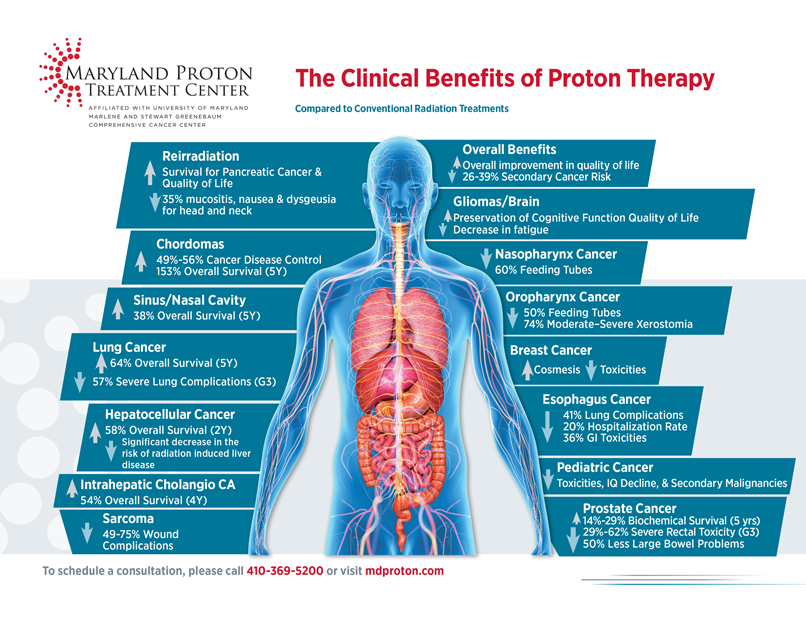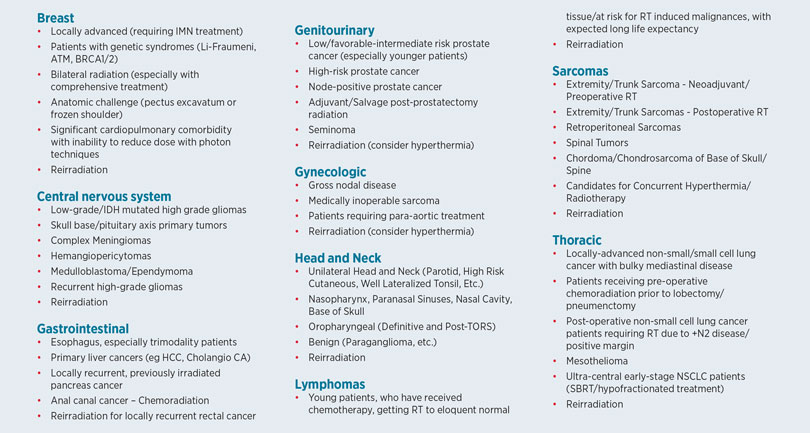Proton Therapy Information for Medical Professionals
We’re very proud to offer a non-invasive cancer treatment for patients with localized, solid tumors. Proton therapy is a form of radiation treatment that uses a precise beam of ionized hydrogen protons to target cancerous cells. Protons travel directly to the site of the tumor and stop, sparing healthy tissue.
The following images show the clinical benefits of proton therapy as compared to conventional radiation treatments.
Click here or the images below to download the clinical benefits fact sheet.
Additionally, proton therapy can benefit patients who face certain challenges:
- Require very high-dose radiation for conditions like chordoma, chondrosarcoma, skull-based tumors, paraspinal tumors and certain sarcomas.
- Have considerable longevity and risk of developing complications from radiation therapy
- Seek maximal reduction of integral dose exposure (radiation exposure to the rest of the body)
- Need retreatment in a previously irradiated tumor site
Proton therapy referrals
Our ability to provide excellent care to patients is only possible through collaboration with physicians in the region and around the world. The University of Maryland Department of Radiation Oncology would like to earn your trust in helping care for your patient.
- We challenge devastating malignancies by making available and applying innovative technology with comprehensive cancer treatment.
- We offer an array of complex treatment modalities that are relatively unique and are often not available in your region or at other cancer centers
- We provide full concierge services to make your patient’s journey at our facility as seamless as possible. This includes:
- Pre-coordination of appointments
- Free valet parking
- An escort to greet the patient at the front of the facility and take the patient to their appointment
- Dedicated concierge staff and much more
At the Maryland Proton Treatment Center (MPTC), referring physicians play a role in patient care before, during and after proton therapy. In the video below, Roopa Gupta, MD, of Atlantic General Hospital, shares her experience referring patients to MPTC with Elizabeth Nichols, MD, Associate Professor and Clinical Director of Radiation Oncology at the University of Maryland School of Medicine.
Preferred providers program
Our core mission is excellence in patient care. We are inspired by our patients and driven by a passion for healing. In order to serve health care providers and their patients at the highest level, we are proud to introduce the Preferred Provider Program – a program that offers access, concierge services, ease of record-sharing and successful reconnections back to you, the patient’s referring provider.
In allowing the University of Maryland Department of Radiation Oncology to be your preferred provider of complex radiation treatment modalities, you and your patients will have access to the following:
- International patient program. MPTC wants to make proton therapy available to as many people as possible. Competitive rates and concierge services are provided to make proton therapy more accessible to international patients. To help determine whether a patient is eligible for proton therapy or a clinical trial, MPTC will offer a complimentary, physician-to-physician video conference screening to the patient’s referring provider to help alleviate any unnecessary travel.
- SIR-Spheres. This advanced modality is for treating patients with particularly difficult-to-remove cancers of the liver, including liver tumors spread from colorectal cancers. It delivers millions of radioactive particles called SIR-Spheres (microspheres) directly to the tumor and is performed as an outpatient procedure. When compared to external beam radiation therapy, this treatment delivers a higher radiation dose to the tumor, while sparing more of the healthy liver.
- Hyperthermia. This therapy uses heat to treat a broad spectrum of malignancies, and boost the effectiveness of traditional treatments for many types of tumors. Patients can continue receiving radiation at their current radiation center while undergoing hyperthermia. In randomized clinical trials, these treatments have demonstrated improvement in local tumor control and survival rates.
- GammaPod was invented at the UM Department of Radiation Oncology and represents a paradigm change in the treatment of early-stage breast cancer. As a first-of-its-kind radiation therapy system in the world, the GammaPod is dedicated to the delivery of stereotactic radiation for the treatment of early stage breast cancer. This noninvasive method uses thousands of precisely focused beams of radiation from 36 rotating sources in combination with a light-vacuum assisted cup that immobilizes the breast. This technique spares surrounding healthy tissue minimizing damage to the breast and surrounding vital organs, such as the heart and lungs.
- Ease of records access and successful reconnections. Our department is committed to providing you with immediate access to our clinicians. In an effort to exchange information quickly and provide easy access to records, we have streamlined our patient and referring physician connection through various processes. When you refer a patient, they are typically seen in 2 days or less after receipt of the required records. We will reach out within 24 hours of your patient’s initial consultation to provide a summary of the appointment. This ongoing communication also helps ensure a successful reconnection back to you as patients are transitioned back into your care.
Have a patient you would like to refer? Contact us today at 410-369-5200.
MPTC Clinical Trials
MPTC is dedicated to advancing scientific knowledge about the role of proton therapy in the treatment of cancer. All patients treated at MPTC have access to a wide range of clinical trials available through the Maryland Proton Alliance.
To view a list of clinical trials currently open at MPTC, please click here.
Proton therapy insurance coverage
Maryland Proton Treatment Center is committed to providing excellent access to care. As such we have taken a leadership role in the industry and have made proton therapy cost neutral. We bill your patient’s insurance company the same amount for traditional X-ray radiation therapy as we do for proton therapy. This policy ensures that your patient is presented with the best radiation treatment type for their cancer and helps eliminate barriers to treatment.
The center accepts a variety of insurance types and will be happy to discuss coverage specifically at 410-369-5200.
General guidelines include:
- General Coverage: Proton therapy is generally covered by Medicare (non-HMO). In many cases, patients covered by Medicare supplemental insurance often incur few net-out-of-pocket expenses for treatment after deductibles, copays/coinsurance, and annual maximum payments are met.
Maryland Proton Alliance
The Maryland Proton Alliance (MPA), represents a new organizational framework for proton therapy at UM SOM that may serve as a national model for patient-centered cancer care.
MPA is the result of long-term collaborative planning designed to make innovative research activities integral at MPTC. As part of its mission, the MPA brings together the multi-platform global research and education programs of the University of Maryland School of Medicine with the clinical services of MPTC—combining the resources of UM SOM, with support from federal, industry, regional and global stakeholders.
Research and the advancement of proton therapy technology is central to MPTC. Please contact us to see if your patient qualifies for a clinical trial.
Connect With MPTC
If you’re a physician or medical professional interested in connecting with MPTC, please complete the form below and we’ll be in touch.



